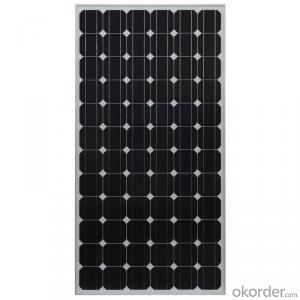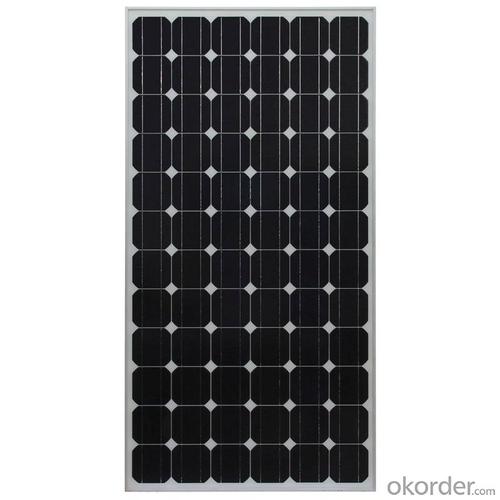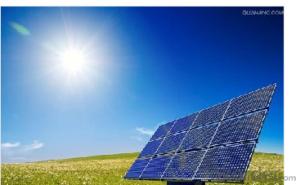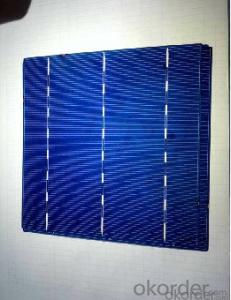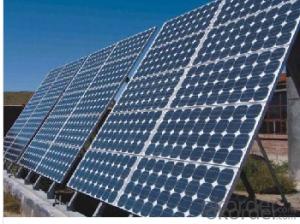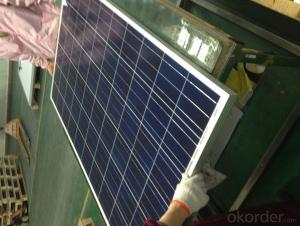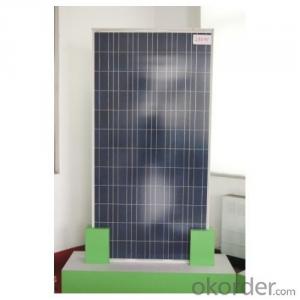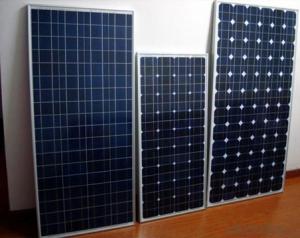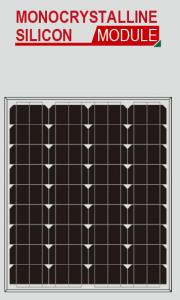115W Home Roof Solar Panels - Good Quality & Low Price
- Loading Port:
- Shanghai
- Payment Terms:
- TT OR LC
- Min Order Qty:
- 1000 watt
- Supply Capability:
- 1000000 watt/month
OKorder Service Pledge
OKorder Financial Service
You Might Also Like
Specification
Monocrystalline Silicon Solar Pv Module 115w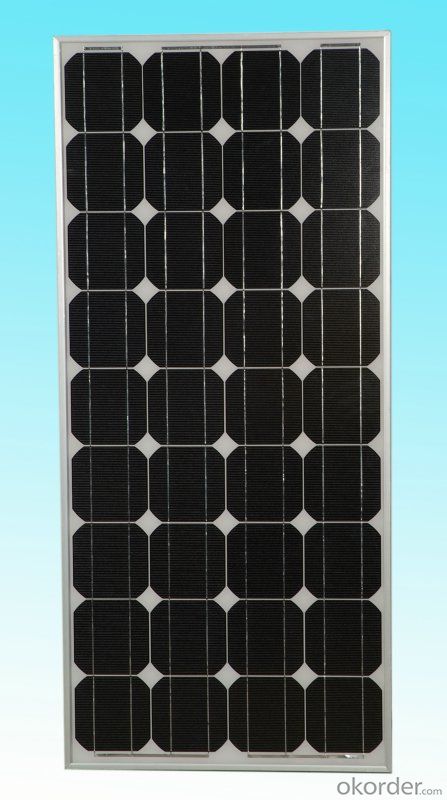 To ensure product quality, we not only introduce the advanced manufacture and test equipments, but also carry out strict quality control system.
To ensure product quality, we not only introduce the advanced manufacture and test equipments, but also carry out strict quality control system.
Each solar module should be tested at least four times during the whole production process, and the final output power tolerance is limited to ±3%.
Specifications for Mono-crystalline Silicon Solar Module with 115W Maximum Power
| Mechanical Characteristics | |
| Cell type | mono-crystalline silicon solar cells |
| Cell layout | 4*18 |
| Number of cells | 72pcs |
| Module dimensions | 1250*670*35mm |
| Frame | anodized aluminum,grey or black |
| Junction box | IP65 |
| Connectors | MC4 or MC4 compatible(optional) |
| Net weight | 9.6kg |
| Packing | 2pcs/ctn |
| Electrical Characteristics | |
| Peak power(Pmax) | 115W |
| Power tolerance | ±3% |
| Max.system voltage | 715VDC |
| Open circuit voltage(Voc) | 21.5V |
| Short circuit current(Isc) | 7.33A |
| Max.power voltage(Vmp) | 17.5V |
| Max.power current(Imp) | 6.57A |
| Temperature coefficients of Isc | 0.035%/ºC |
| Temperature coefficients of Voc | -0.33%/ºC |
| Temperature coefficients of Pmax | -0.43%/ºC |
| Cell Efficiency | ≥17% |
| FF | 73% |
| Standard Test Condition(STD) | Irradiance:1000W/m²;Cell temperature:25ºC;AM:1.5 |
Features:
1) High reliability with guaranteed +/-3% output power tolerance
2) The modules can withstand high wind-pressure, snow loads and extreme temperatures
3) Bypass diodes to minimize power loss with shading
4) High and stable conversion efficiency to ensure the highest quality
Quality and Safety
1) Industry leading power output warranty, 25 year 80%, 10 year 90% power warranty and 3 year power warranty
2) ISO9001: 2008 (Quality Management system) certified factory
3) Product Quality warranty & products Liability Insurance to guarantee and user' benefits
EN 6100-6-3: 2007 EN 6100-3-1: 2007(IEC 61000-4-2: 2008
Our advantages:
High quality materials: High insulation TPT, Anti-aging EVA
Focus on each process during manufacture
Experienced engineers and workers
Fast delivery: 7-15 DAYS High efficiency and long time warranty
- Q: Can solar panels be used in commercial buildings?
- Yes, solar panels can definitely be used in commercial buildings. In fact, many businesses are increasingly installing solar panels on their rooftops or in open spaces adjacent to their premises. Solar panels are a sustainable and cost-effective solution for generating renewable energy, reducing electricity bills, and lowering carbon footprints in commercial settings.
- Q: Are there any fire risks associated with solar panels?
- Yes, there are fire risks associated with solar panels, albeit they are extremely rare. These risks can occur due to factors such as faulty installation, damaged wiring, or issues with the electrical components. However, industry standards and regulations have significantly improved over time, ensuring safer installations. Additionally, regular maintenance and inspections can help mitigate these risks and ensure the safe operation of solar panel systems.
- Q: if I have a battery bank of of 6 L-6 Trojan batteries, 6V 390AH, wired in series parallel to give me 2V at 70AH (or 4,040WH) what kind of solar panels should I purchase assuming I have 8 hours of sunlight, a solar tracking system and I want to make sure I can fully recharge my batteries everyday if i use up all the power every night?i understand there are efficiency issues to consider which i have not calculated in yet. thanks.
- Hi okorder /
- Q: Can solar panels be used in areas with frequent power outages?
- Yes, solar panels can be used in areas with frequent power outages. Solar panels generate electricity from sunlight, which means they can continue to produce power even when the main grid is down. However, for uninterrupted power supply during outages, it is important to have an energy storage system, such as batteries, to store excess energy generated during the day for use at night or during power outages.
- Q: I have a home made 24 volt electric cart. It is powered by two 2Volt deep cycle batteries. Since the motor runs on 24 volts the batteries are wired in series to produce the 24 volts. I only have a 2 volt battery charger, but I also have two 2 volt solar panels. It is a pain having to unhook wires, rewire it, or charge them one at the time.HERE IS THE QUESTION REALLY... Can I wire the two 2 volt solar panels together in series (ie: negative to positive) then connect it to the existing 24 volt system and have it charge the batteries fine. I know basic wiring, but I know nearly nothing about solar panels, will it work fine? will it cause them to break? or short out?(additional info, the solar panels are only rated at 5 amps so it will not overcharge the batteries or anything)
- You should be fine with the series as long as you use a multimeter and verify configuration Get a charge controller. Will be worth the small cost and prevent many issues.
- Q: What specification of solar panel would I need to power a laptop every day? I would need to use it for about 0 hours or so every day. I don't know anything about solar panels, but I am seriously thinking of getting one now and don't know who to ask.
- Ive been employing the comparable photograph voltaic panels for 5 years, have flow some instances so as that they final lots longer than the roofs weve had over us. i'm coaching my young ones a thank you to construct wind turbines, because of the fact we shop having potential failiures whilst the wind blows. and recently its have been given very windy. I can charge banks of battery's and shop my place of work working from dc-ac converters.
- Q: hi, i got a pond and i am planning of putting some lights on it during night time. but i want to use solar panels and i have done a bit of research about solar panels and i know how they work, i know that the common voltage to use is 2v so you can use car batteries or deep cycle batteries, but my question is:. what wattage of bulb can you recommend2. how long it would take to drain my battery (can i have it overnight)3. and what wattage of solar panel should i get enough to recharge my battery the next day.hope anyone can help..thanks
- You can get 6V cells and SLA batteries. You would get a panel and batteries suitable for the lights you get though. Depending on what you want to do, you shoud look into LED lighting, which is more efficient than incandescent. You do not want to drain your battery flat. Rather you want to draw only 2/3 of its capacity of so. You would find the lights you want (likely 2VDC), and add up the current they draw, and get a battery that would supply enough capacity (in AH, which is amps time hours) for a couple nights use (to account for weak solar days), and a solar panel to charge two days of use in one good day. You would use a charge controller so that the solar panel does not over charge the battery, and some sort of dusk timer to turn your lights on at dusk and off several hours later.
- Q: I have had this 2v portable Solar Panel for my apartment for awhile. Only problem is that I have no balcony and I can barely get enough sun to use it with my Cobra 450 400-800 watt outlet converter. Can someone advise me a better method to use these? Like do I have to get more 2v solar panels? I have a small apartment and use it on one window. Also is it possible for me to buy a portable storage tank to store the energy gathered from the sun by the solar panel?
- How okorder /
- Q: Can solar panels be installed in areas prone to hurricanes or tornadoes?
- Yes, solar panels can be installed in areas prone to hurricanes or tornadoes. However, additional precautions and engineering considerations need to be taken to ensure their durability and resistance against strong winds and potential impact from debris. This can include using reinforced mounting systems, implementing proper anchoring techniques, and selecting panels that meet stringent wind load requirements.
- Q: How can I calculate the amount of watts needed for a solar panel to power a water and air pump in gal/hr and a 600 watt LED light?
- Mimi: Solar Power is not really that economical, and has many other disadvantages as well. You did not specify much info in your question as to the size of the water or air pump. So let's make some assumptions to get you some numbers. ) Let's say the water and air pump are about HorsePower (HP). The HP pump , considering efficiency losses, will draw around ,000 Watts , or kW. 2) The 600 Watt LED Light is quite high --- they are usually much smaller lights 40 Watts or less. BTW --- these LED lights are very expensive light as well. Just so you are aware. Between the pump(s) ( maybe 000 to 400 Watts) and the 600 Watt light ----- and without knowing the specifics --- you are probably looking at around 2,000 Watts or 2 kW. A 2 kW Solar PV unit will run around $20,000. The PV unit will only run at full capacity during daylight hours. They usually average about 5 hours per day. So you will only be able to run your pump and LED Lights during the middle of the day --- maybe 0:00 AM to 5:00 PM. If you want to run the pump and lights after sundown, you will need battery back-up. The electric storage batteries will likely run about an extra $5,000. They will last about 5 years. If you decide this doesn't work out well --- you can stay with the local utility --- at $0.0 per kWh. It will cost you about $0.0 per hour to run the pump --- maybe 30 to 50 cents per day. It would cost you about 6 cents per hour to run your light. Maybe 30 or 40 cents per day. You could essentially run your pumps and light several hours each day --- all for about $ per day, or $365 per year. This sounds like a less costly alternative.
Send your message to us
115W Home Roof Solar Panels - Good Quality & Low Price
- Loading Port:
- Shanghai
- Payment Terms:
- TT OR LC
- Min Order Qty:
- 1000 watt
- Supply Capability:
- 1000000 watt/month
OKorder Service Pledge
OKorder Financial Service
Similar products
Hot products
Hot Searches
Related keywords
